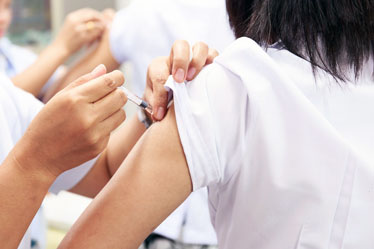The United States Congress, in conjunction with the American Social Health Association (ASHA) and the National Cervical Cancer Coalition, designated January as Cervical Health Awareness Month to increase public knowledge of cervical health and encourage women to get screened for cervical cancer and vaccinated against the diseases that cause it.

Cervical Health Facts
The cervix is a long, cylinder-shaped passage between the vagina and the uterus. It has two main parts, the cervix itself and the opening of the cervical canal known as the “endocervix.” The cervix is covered in squamous cells and the endocervix is covered in columnar cells. These different types of cells meet at a point between the vagina and the uterus known as the “transformational zone.” The transformational zone is the part of the cervix that is most susceptible to developing cancer.
Unfortunately, approximately 12,000 women each year are diagnosed with cervical cancer in the United States and if not detected early, it can be lethal. When precancerous cells develop in the cervix they do not usually cause symptoms until the cancer has progressed to a point that is both dangerous and difficult to treat.
Symptoms of cervical cancer include:
- Pelvic pain unrelated to menstruation
- Abnormal bleeding, occurring between the menstrual cycle, after sexual intercourse or in postmenopausal women
- Increased urination and/or pain during urination
- Pelvic pain not related to your menstrual cycle
- Abnormal vaginal discharge
Many of the symptoms for cervical cancer are also common signs of other health conditions. If women are suffering from any of these symptoms, they should contact their gynecologist for consultation.
Get Screened for Cervical Cancer
If detected early, cervical cancer is one of the most treatable forms of cancer. The disease develops slowly and is easily detected with a simple pap test. The pap test is part of any well woman exam and is simple and brief. Usually, doctors recommend women should get a pap test every one to three years, but some women have medical conditions or health histories that may require more frequent testing.
The Link Between HPV and Cervical Cancer
The sexually transmitted disease (STD), Human Papillomavirus (HPV), is found in 99 percent of all types of cervical cancers. HPV is an extraordinarily common virus with more than 100 different types. Nearly one in four people are currently infected with the virus in the United States, and about 14 million people become infected with HPV each year, including adolescents. In most cases, HPV does not cause any medical problems because the immune system prevents the disease from developing further, but occasionally the virus persists and causes abnormal cervical cells to form, which can become cancerous. Preventing HPV, therefore, is a major step towards preventing cervical cancer.
 There’s a Vax for That!
There’s a Vax for That!
It can be alarming to look at HPV rates, but the good news is that there are vaccines that can prevent HPV and dramatically decrease a person’s risk of developing cervical cancer. Gardasil® and Gardasil® 9 protect against several of the most harmful types of HPV, and the vaccines are appropriate for both males and females. Men are often carriers of HPV and can suffer from several different types of cancers that develop from the STD. It is advised that males receive the HPV vaccine between the ages of 11 and 21, and females receive it between the ages of 11 and 26.
Promote Cervical Health
The best way promote cervical health is simple. If you are a good candidate for it but have not yet been vaccinated, ask your doctor which HPV vaccine is best for you. Parents can also get their adolescent children vaccinated to prevent future infection.
It is recommended that people always practice safe sex, and people in relationships can encourage their partners to get vaccinated, too. People who are sexually active should be tested for the Human Papillomavirus, and take proactive steps to further protect their health.
Be Proactive About Cervical Health
Cervical cancer is not something to be scared of; it is something to be vigilant against. Vaccination, STD testing, and regular screening are all easy steps that can have huge benefits to your lifelong health. Cervical cancer is preventable and treatable, so get tested and screened today!
If you have any questions or concerns about your cervical health or want to discuss preventive care this Cervical Health Awareness Month, please contact Kansas City ObGyn today at This email address is being protected from spambots. You need JavaScript enabled to view it. or 913-948-9636.






